Climate Change and Health: Session II - Untangling Complex Exposures and Health Effects
Archived: Friday, November 4, 2022
Sponsored by: NIEHS Superfund Research Program
The NIEHS Superfund Research Program (SRP) is hosting a Risk e-Learning webinar series focused on scientific research and tools that can be used to promote health and resilience to climate change.
The series will feature SRP-funded researchers, collaborators, and other subject-matter experts who aim to better understand and address how climate change affects human exposures to hazardous substances and the public health consequences of a changing climate and identify ways to build health resilience.
People are continually exposed to a complex mixture of environmental toxicants. The second session will describe how extreme weather events, such as hurricanes and wildfires, and other extreme events affect the distribution of these pollutants, their toxicity, and the potential increased risk of exposure to humans. Presenters will introduce new models to track the movement of multiple contaminants in the environment and will discuss the health effects of these complex exposures. We will also hear about the NIH Climate Change and Health Initiative and other ongoing efforts at NIH to reduce the health consequences associated with climate change.
This webinar is the second in a three-part series, please visit the pages for Session I and Session III to register and learn more.
Gwen Collman, Ph.D., of NIEHS, will introduce a new NIH-wide effort to build a program in Climate Change and Health. She will briefly describe the strategic framework for this work.
Elsie Sunderland, Ph.D., of Harvard University and the University of Rhode Island SRP Center, will discuss effects of climate driven processes on the distribution and bioaccumulation of several toxicants in the marine environment. Using examples from large scale biogeochemical models for polychlorinated biphenyls, mercury, and perfluorooctane sulfonate, this presentation will discuss how ongoing climate change is affecting human exposures to toxicants through consumption of marine fish — one of the world's last wild foods.
Elena Craft, Ph.D., of the Environmental Defense Fund, will share work related to understanding the effects of environmental disasters on the distribution of pollutants, specifically in response to hurricanes. In addition, she will discuss collaborations and sampling campaigns organized between SRP research centers, the private sector, and community partners to address human health concerns in the wake of major hurricanes.
The prevalence of wildfires continues to grow concurrent with global climate change, with exposures resulting in increased disease risk. Characterizing these health risks remains difficult due to the wide landscape of exposures that can result from different burn conditions and fuel types. Julia Rager, Ph.D., of the University of North Carolina SRP Center, will review ongoing research aimed at identifying chemical drivers of wildfire toxicity and their associated underlying mechanisms. Research includes the integration of computational modeling to parse the major constituents of wildfire-associated toxicity. A novel 'transcriptomic similarity scoring' method will also be discussed to highlight the grouping of variable biomass burn conditions to yield insight into risk assessment strategies to ultimately protect public health. Lastly, new biological mechanisms surrounding wildfire-induced toxicity will be highlighted, focusing on the role of extracellular vesicles in cross-tissue communication and disease etiology.
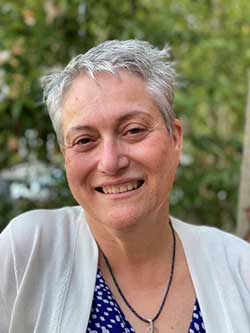 Gwen Collman, Ph.D., NIEHS (collman@niehs.nih.gov)
Gwen Collman, Ph.D., NIEHS (collman@niehs.nih.gov)
Gwen Collman, Ph.D., is the Director of the Office of Scientific Coordination, Planning and Evaluation in the Office of the Director at the NIEHS. She provides leadership on the planning and implementation of complex high priority research programs in many areas of environmental health sciences including public health, population science, and community engagement. Currently, Dr. Collman is the strategic advisor for coordination of the NIH wide Climate Change and Health Program. Dr. Collman holds a Ph.D. in environmental epidemiology from the Gillings School of Public Health at the University of North Carolina. Dr. Collman was the Director of the Division of Extramural Research and Training for 12 years. She was the founding director of the NIEHS/NCI Breast Cancer and Environment Research, Genes, Environment and Health program and the NIEHS/USEPA Children’s Environmental Health Centers program. She is a member of the NIEHS executive leadership team.
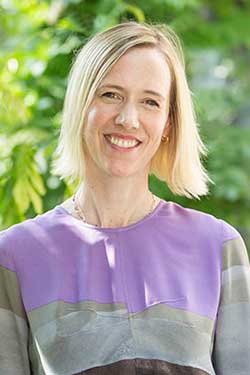 Elsie Sunderland, Ph.D., Harvard University/ University of Rhode Island SRP Center (ems@seas.harvard.edu)
Elsie Sunderland, Ph.D., Harvard University/ University of Rhode Island SRP Center (ems@seas.harvard.edu)
Elsie Sunderland, Ph.D., is the Gordon McKay Professor of Environmental Chemistry at Harvard University. She holds faculty appointments in the Harvard John A. Paulson School of Engineering and Applied Sciences, the Harvard T.H. Chan School of Public Health, and the Department of Earth and Planetary Sciences, in the Faculty of Arts and Sciences. Sunderland's research aims to better understand how chemicals released by human activity interact with natural ecosystems and affect living systems. A main innovation of her group’s work is to quantitatively analyze the entire exposure pathway for aquatic pollutants to identify key processes that have a large influence on their accumulation in biota. Prior to joining the faculty at Harvard, she spent five years working to inform environmental policy decisions with best-available science at the headquarters for the U.S. Environmental Protection Agency (U.S. EPA) in various offices. Her work at the U.S. EPA included regulatory impact assessments for Hazardous Air Pollutants and developing guidance on best use of environmental models to inform regulatory decisions. Much of Sunderland’s recent work has focused on characterizing diverse exposure sources for per- and polyfluoroalkyl substances (PFAS), including drinking water and seafood, and developing chemometric indicators for source attribution.
 Elena Craft, Ph.D., Environmental Defense Fund (ecraft@edf.org)
Elena Craft, Ph.D., Environmental Defense Fund (ecraft@edf.org)
Elena Craft, PH.D., is Associate Vice President of Climate and Health at Environmental Defense Fund, one of the world’s leading environmental organizations. Based in Texas, Dr. Craft has played a central role in bringing together multiple agencies to expand monitoring capabilities and streamline how cities respond to hazardous air pollution and climate-fueled weather disasters, with particular emphasis on identifying vulnerable communities closest to the facilities that most threaten public health and safety. She has helped public officials to identify toxicological exposures from large releases of air pollution, including during climate-fueled disasters, like hurricanes. Her work uncovered a massive leak of cancer-causing benzene in a Houston neighborhood during Hurricane Harvey in 2017. She also helped a historically Black neighborhood along the Houston Ship Channel to purchase and install the largest community- owned and -managed network of air quality monitors in the state of Texas. Dr. Craft serves as an adjunct assistant professor at the University of Texas Health Sciences Center and Texas A&M University, and as a Kinder fellow at Rice University. Through those connections, she has pushed forward research efforts to protect public health, including a leading role in the establishment of the Texas Flood Registry – the first registry after catastrophic flooding – to understand the Hurricane Harvey’s toll on people’s physical and mental health.
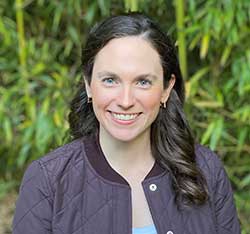 Julia Rager, Ph.D., University of North Carolina at Chapel Hill SRP Center (jrager@unc.edu)
Julia Rager, Ph.D., University of North Carolina at Chapel Hill SRP Center (jrager@unc.edu)
Julia Rager, Ph.D., is an Assistant Professor at the University of North Carolina (UNC) at Chapel Hill, where she leads research evaluating environmental exposures and their impact on public health. Her current research interests surround the evaluation of chemical mixtures that occur in the environment and their associated toxicity and health risks. Dr. Rager’s unique approach to mixtures evaluations couples in silico modeling with exposure science and molecular toxicology methods to improve chemical-disease linkages and more efficiently screen for understudied chemicals that commonly co-occur in the environment. Dr. Rager is also leading initiatives to train the next generation of environmental health researchers on current data science practices and computational methods.
Moderators:
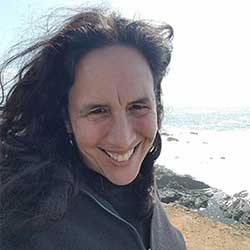 Viccy Salazar, U.S. Environmental Protection Agency (salazar.viccy@epa.gov)
Viccy Salazar, U.S. Environmental Protection Agency (salazar.viccy@epa.gov)
Ms. Viccy Salazar is a Sustainability and Climate Advisor at the U.S. Environmental Protection Agency, Region 10. She is a primary author on the climate section of EPA’s new Draft 2022-2026 Strategic Plan and on EPA’s Climate Adaptation Action plan which was released in October 2021. Prior to her current role, she spent 25+ years in Region 10, most recently as R10’s Senior Sustainability Advisor in Seattle.
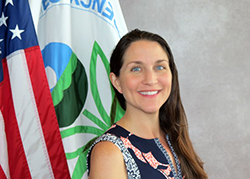 Jean Balent, U.S. EPA Technology Innovation and Field Services Division (balent.jean@epa.gov or 202-566-0832)
Jean Balent, U.S. EPA Technology Innovation and Field Services Division (balent.jean@epa.gov or 202-566-0832)
Ms Balent is on the staff of the EPA's Technology Innovation and Field Services Division where she has worked to collect and disseminate hazardous waste remediation and characterization information since 2003. Ms Balent manages the Clean Up Information Network website and actively supports online communication and collaboration resources available to EPA. She formerly worked with the US Army Corps of Engineers Environmental Engineering Division in the Buffalo District. Ms Balent was also a member of the SUNY-Buffalo Groundwater Research Group where she constructed and tested large scale models of groundwater flow. Ms Balent has also conducted research relating to the Great Lakes, environmental remediation, and brownfields re-development. She holds a Bachelor's degree in environmental engineering from SUNY-Buffalo and a Master's degree in Information Technology from AIU.
Webinar Slides and References:
-
 Slide Presentation for Gwen Collman, Ph.D. (2.53MB/PDF)
Slide Presentation for Gwen Collman, Ph.D. (2.53MB/PDF)
-
 Slide Presentation for Elsie Sunderland, Ph.D. (5.78MB/PDF)
Slide Presentation for Elsie Sunderland, Ph.D. (5.78MB/PDF)
-
 Slide Presentation for Elena Craft, Ph.D. (7.30MB/PDF)
Slide Presentation for Elena Craft, Ph.D. (7.30MB/PDF)
-
 Slide Presentation for Julia Rager, Ph.D. (14.5MB/PDF)
Slide Presentation for Julia Rager, Ph.D. (14.5MB/PDF)
Additional Resources:
- Visit the NIEHS Superfund Research Program (SRP) Risk e-Learning page to learn more about this webinar series.
- Email srpinfo@mail.nih.gov to be added to the SRP Risk e-Learning listserv.
- SRP December 2021 Science Digest on Climate Change
Help & FAQs
- Frequently Asked Questions
- Content Questions?
Call Mali Velasco Delgado at 919-794-4708 or mali.velascodelgado@nih.gov - Technical Problems?
Leave us a comment - Cancel Your Registration
- My Participation Records
- CEU Credits and PDHs
Zoom Resources
This seminar will be delivered through Zoom. Participants are encouraged to update to the latest version of the Zoom application for the best experience. If you are unable to install the Zoom application, most functions will be available if you join just using a modern web browser such as Chrome, Edge or Firefox. We strongly encourage you to run the Zoom Meeting Test prior to attending this seminar. Technical support on the day of the seminar will be very limited and subject to significant delays.
Rehabilitation Act Notice for Reasonable Accommodation
It is EPA's policy to make reasonable accommodation to persons with disabilities wishing to participate in the agency's programs and activities, pursuant to the Rehabilitation Act of 1973, 29 U.S.C. 791. Any request for accommodation should be made to Mali Velasco Delgado at 919-794-4708 or mali.velascodelgado@nih.gov, preferably one week or more in advance of the seminar, so that EPA will have sufficient time to process the request. EPA would welcome specific recommendations from requestors specifying the nature or type of accommodation needed. EPA welcomes specific recommendations from requestors specifying the nature or type of accommodation needed. Please note that CLU-IN provides both alternate phone call-in options and closed captioning for all webinars, and requests for these specific accommodations are not necessary.
Rehabilitation Act Notice for Reasonable Accommodation
It is EPA's policy to make reasonable accommodation to persons with disabilities wishing to participate in the agency's programs and activities, pursuant to the Rehabilitation Act of 1973, 29 U.S.C. 791. Any request for accommodation should be made to Mali Velasco Delgado at 919-794-4708 or mali.velascodelgado@nih.gov, preferably one week or more in advance of the webinar, so that EPA will have sufficient time to process the request. EPA would welcome specific recommendations from requestors specifying the nature or type of accommodation needed. EPA welcomes specific recommendations from requestors specifying the nature or type of accommodation needed. Please note that CLU-IN provides both alternate phone call-in options and closed captioning for all webinars, and requests for these specific accommodations are not necessary.
Webinar Recording
By participating in this CLU-IN webinar, you automatically agree to authorize recording of audio and visual content presented during this live event and consent to subsequent use of this recording in the public domain by the U.S. Environmental Protection Agency. This recording may include questions, comments and poll responses provided by you during the live event in addition to your name, voice, image or likeness. This recording will be made available after the conclusion of the live event as part of the CLU-IN webinar archives, and will remain available indefinitely. If you do not wish to consent to the recording, please do not join the live event, and contact Jean Balent at 202-566-0832 or balent.jean@epa.gov to discuss your concerns.
Content Disclaimer
This webinar is intended solely to provide information to the public. The views and opinions expressed as part of this webinar do not necessarily state or reflect those of the U.S. Environmental Protection Agency. It is not intended, nor can it be relied upon, to create any rights enforceable by any party in litigation with the United States, or to endorse the use of products or services provided by specific vendors. With respect to this webinar, neither the United States Government nor any of their employees, makes any warranty, express or implied, including the warranties of merchantability and fitness for a particular purpose, or assumes any legal liability or responsibility for the accuracy, completeness, or usefulness of any information, apparatus, product, or process disclosed, or represents that its use would not infringe privately owned rights.

